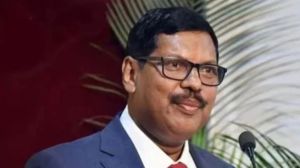Happily in the make-believe
To tell you the truth, I had hoped to write this Wednesday's column on the so-called revelations of Brigadier Surinder Singh. But even 39...

To tell you the truth, I had hoped to write this Wednesday’s column on the so-called revelations of Brigadier Surinder Singh. But even 39,000 feet above the Atlantic and with two generous shots of Glenfiddich inside me, it is difficult to concoct new wisdom on the controversy.
It is tough to go on lecturing on an issue that doesn’t seem to excite anyone anymore. Except perhaps the writers of the ghastly copy in the ads sponsored by the fly-by-night, self-proclaimed NPOs (non-political organisations) fronting for the Congress and the BJP. Since advertisements bring revenue to newspapers, this is one proxy war I am not complaining about.
I could complain, however, about how new questions raised on Kargil fail to evoke any popular interest, if not outrage. Brig. Singh, it now seems, may not have been such a hotshot at fighting a real war in Kargil’s wastelands. But he has emerged as a formidable paper warrior with a penchant for letter-writing and has made it quite clear to us that irrespective of whether hewas to blame for it or his superiors, behind the victory in Kargil lay a history that could add one more chapter to The Psychology of Military Incompetence by Norman S. Dixon.
Why is it that his revelations, even if self-serving, do not excite anyone too much? The answer comes from a transatlantic investment banker — one more of the blue Oxford cotton shirt and beige trousers variety. "It is a bit like your bowlers and fielders conceding 310 to the opposition. Then your batsmen score 311 and win the match. Who wants to think of dropping the bowlers and the fielders then?" he asks. Interesting logic. If the final result of Kargil was not a military or diplomatic victory, Brig. Singh’s letter would have brought down a government. Now they won’t prevent one, so guilty on his evidence, from getting re-elected. Which is why I don’t see why I should waste the rest of this piece holding forth on his claims.
IF the flight does not get delayed further and I manage to get the connection to San Diego, I willspend the next three days at the 41st Annual Conference of the International Institute for Strategic Studies. The conference theme is: Into the Next Millennium: America and Global Security. The conference agenda has been split up among committees. It is a pleasant surprise that India finds mention in the keynote papers for four of these.
The Strategic Implications of Terrorism, US Foreign Policy and Multilateral Institution, Defence Diplomacy (written by none other than the former Ambassador to Pakistan and cold warrior, Robert Oakley) and, of course, Non-proliferation and Counter-proliferation and the US Security Agenda. India is by no means central to any of these concerns and ideas. But some of the old contempt and criticism are gone. The Americans haven’t suddenly made a rediscovery of India and fallen in love with it. They are simply learning to relate to India in the new world order.
The focus, however, is quite limited yet. Quite disappointing for those in South Block or on thevarious formal and informal committees advising it, who constantly fantasise about India being coveted as a key member of the pro-US (read anti-Chinese) or anti-US (with China and Russia) grouping. The message, internationally, is: this new power equation is all among the big boys. Why do you Indians presume anybody sees you as such a crucial partner in any such pro or anti-US alliance? When will we Indians stop behaving like guys who run on the field in a cricket match? We are not among the players as yet. But we take ourselves far too seriously as spectators. It is not difficult to see why. A great power is not obsessed with the past. It is constantly thinking about the future, planning and plotting for it, thinking and debating new ideas. No surprise, then, that the two committee papers in which India does not figure are on Information Warfare and the Private Corporate Sector’s Foreign and Security Policies. Somehow, our security debate is still all about justifying Pokharan II and figuringout whether Kargil was a victory or not.
Why has our security/foreign policy debate remained so static, so hopelessly stuck in the past? It is easy to blame it on the age factor, on the fact that it is still dominated by people in their seventies. But let me suggest that age is blamed unfairly for this colossal intellectual sterility. The problem is not that too many of these people are in their seventies. The problem is the minds of too many of them are frozen in the sixties. They are cold warriors who counted for nothing when the cold war was on and they think that is because they did not have the Bomb. Now they have the Bomb, so they want to fight the cold war again, never mind that it has already been fought and won. By the wrong side, maybe, but there is nothing Pokharan can do to alter that situation. But some of us Indians love our world of make-believe.
Certainly, the Air-Indians do. The passenger sitting next to me is none other than Rajan Jetlie, the former chairman and managing director of ourflag carrier and still a loyal Air-India traveller — at least to the few destinations it still takes you to. The talk shifts to the inevitable question: will Air-India survive? One look at Kennedy Airport and it is difficult to see why. Our Jumbo is almost in a minority of one in an airport milling with aircraft sporting Grand Alliance colours. The dominant airlines of the US (United), Germany (Lufthansa), Scandinavia (SAS), Far East (Thai) and Latin America (Varig) have formed a formidable alliance, sharing their overheads and passengers as one airline. The others are learning quickly, mating and regrouping.
In the international aviation business, this is the era of coalitions and alliances. But what is happening back home? Forget reaching out to the world and aligning with it, Air-India and Indian Airlines, though owned and subsidised by the same sucker (the taxpayer), don’t even have the most elementary code-sharing yet — they don’t even accept each other’s tickets on domestic routes. They share afrequent flyer programme but the miles you fly with them are still listed and calculated by hand on patwari-style registers when the tiniest airlines in the world, including our own Jet, have computerised this simple function. Will Air India survive, then? Probably yes, as the official carrier of the politician and the babu. Subsidised, of course, by taxpaying suckers like you and I.



- 01
- 02
- 03
- 04
- 05




























